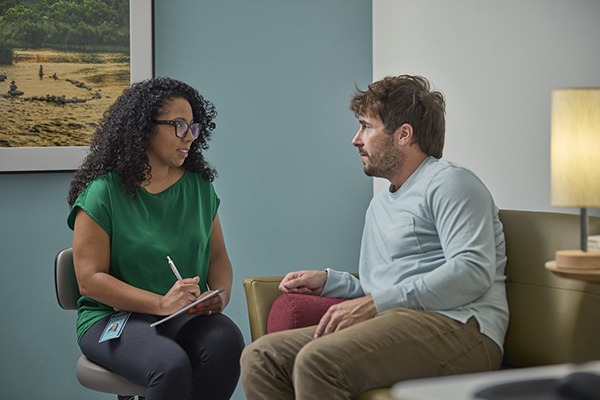Behavioral Healthcare
Call our local community mental health crisis hotline at 512-472-HELP (4357) any time of the day, any day of the week.
Take the first step to better mental health
Behavioral healthcare helps people with problems like feeling very sad, worried, or having trouble with thinking or behavior. It includes talking with a counselor, taking medicine, or other treatments to help you feel better and cope with daily life.
Caring for your mental health is just as crucial as tending to your physical well-being. Our confidential counseling services provide a safe space for individuals to discuss their concerns openly and without judgment.
Asking for help is a sign of strength, and you shouldn’t have to face life’s challenges alone. Our dedicated team is here to support you through difficult times, offering personalized help tailored to your needs. Sometimes, we may also connect you to more resources to ensure you receive comprehensive care.
Know when you need help
Consider seeking help if you experience any of the following symptoms:
- Constant worry
- Feelings of being trapped
- Self-help methods haven’t led to improvement
- Your emotions are affecting your job, relationships, sleep, or eating habits
- Someone close to you suggests counseling
- You want to make changes to your substance use



Are you experiencing a mental health crisis?
Examples of a mental health crisis include:
- Suicidal thoughts or attempts: When someone expresses thoughts of suicide or engages in self-harming behaviors.
- Severe panic attacks or anxiety episodes: Intense and overwhelming feelings of fear or anxiety that interfere with daily functioning.
- Psychotic episodes: Loss of touch with reality, including hallucinations or delusions.
- Severe depression: Persistent feelings of hopelessness, worthlessness, or despair that impair normal functioning.
- Substance abuse or addiction: When substance use becomes uncontrollable and leads to significant impairment in various areas of life.
- Acute psychosis: Sudden onset of severe disorganized thinking, bizarre behavior, or inability to function.
- Intense anger or aggression: Extreme outbursts of anger or violence towards oneself or others.
- Severe mood swings: Rapid and extreme changes in mood that disrupt normal activities and relationships.
- Overwhelming stress or trauma: When traumatic events or ongoing stressors lead to emotional breakdowns or inability to cope.
- Severe eating disorders: When disordered eating behaviors reach a critical level, posing immediate health risks.
Your care team

Dr. Ashley Trust, MD

April Collmer, LCSW

Catherina Conte, LCSW-S

Laura Evanoff, LCSW-S

Cheryl Njapau, LCSW
Take control of your health
At Central Health, Travis County’s Hospital District, we’re committed to providing accessible and compassionate behavioral health services to help individuals lead fulfilling and empowered lives. Ask your doctor about our behavioral health services and start your journey to feeling better today.
Central Health provides these specialty care services to members of the Medical Access Program (MAP) and MAP Basic after referral from a primary care provider.
If you are not a MAP member and want to apply, or just to learn more about the program, click here or call 512.978.8130.